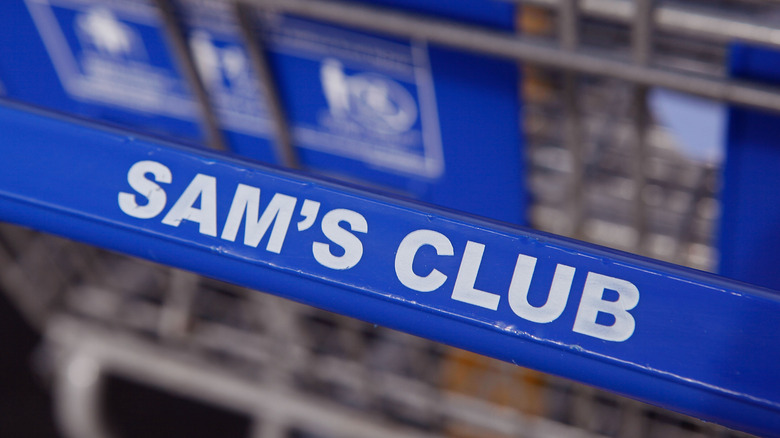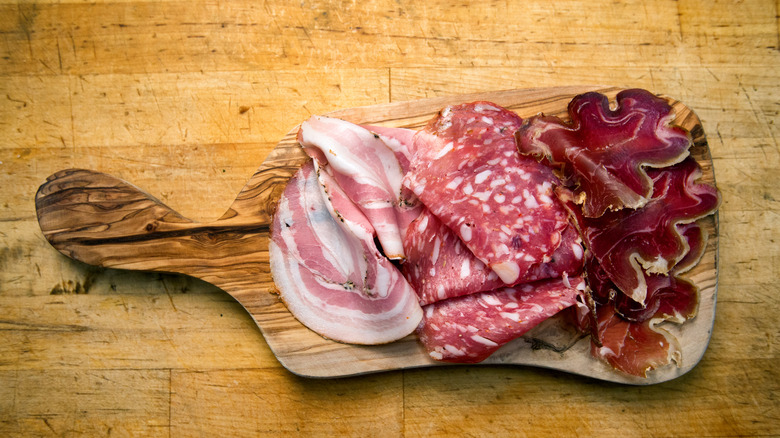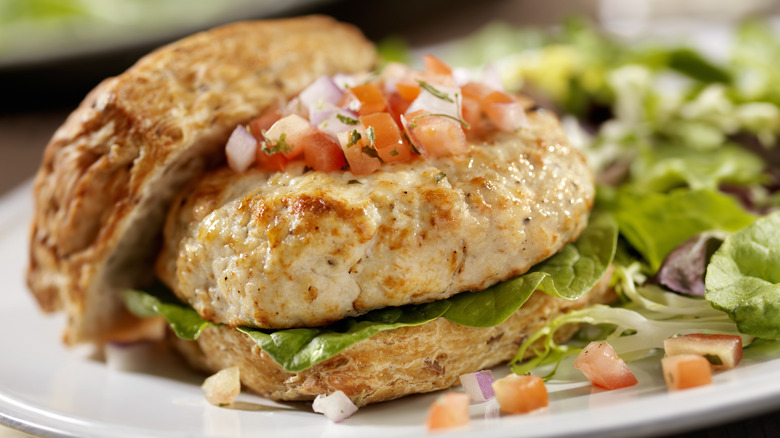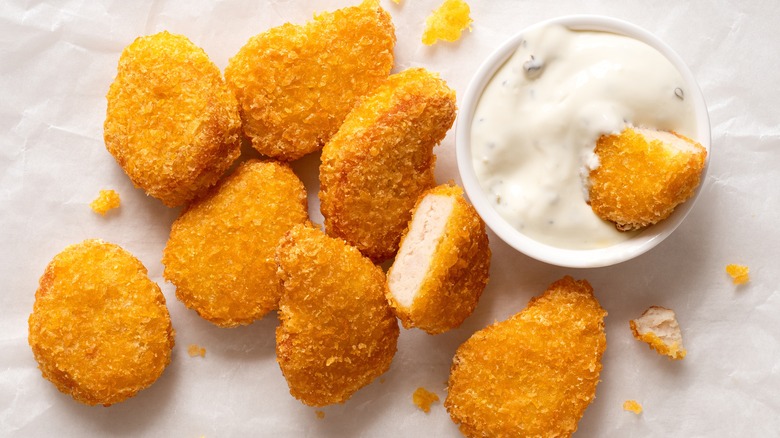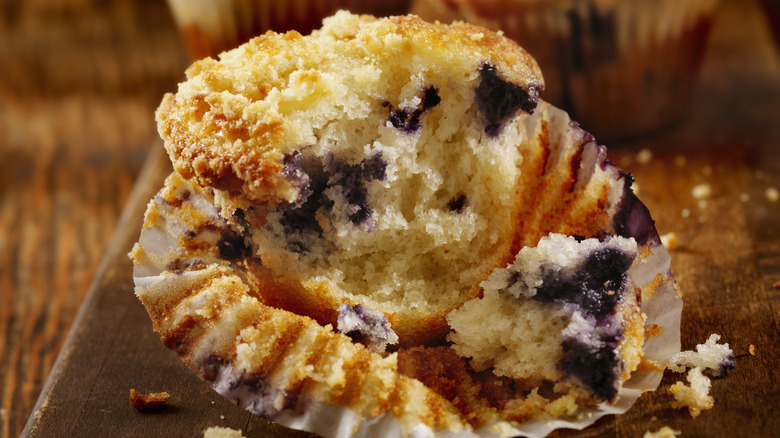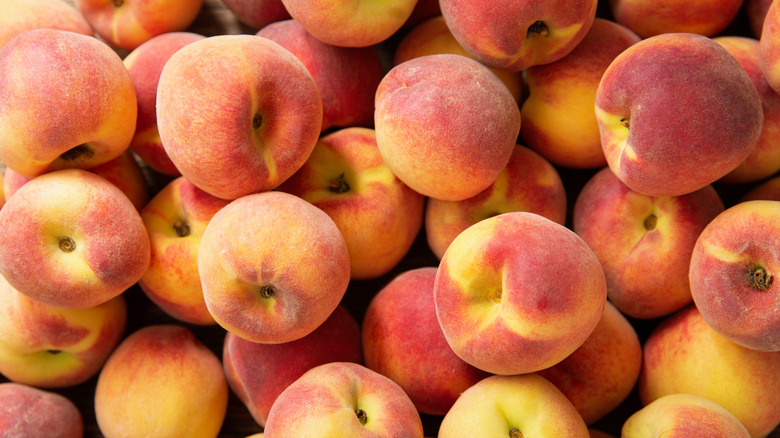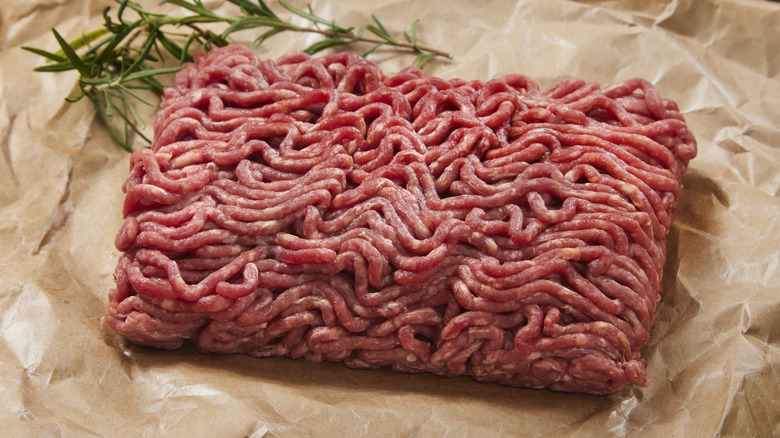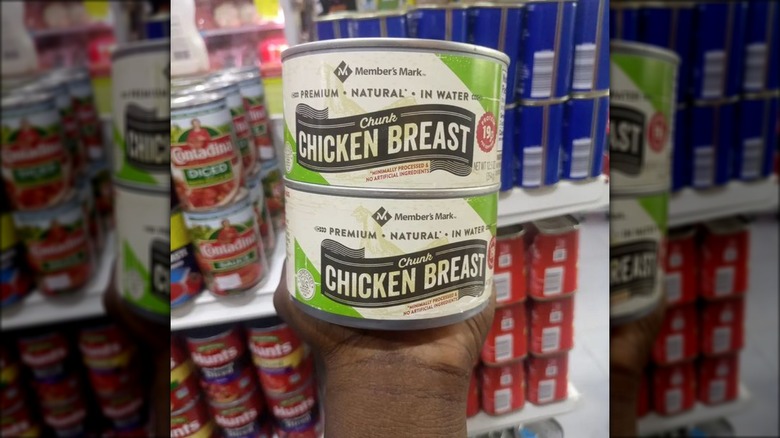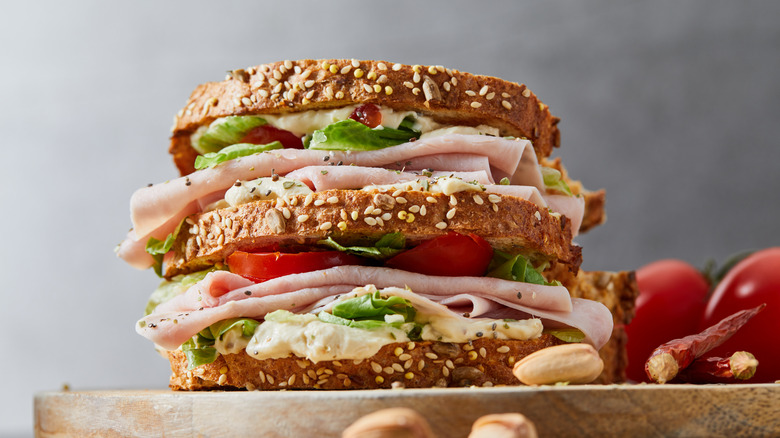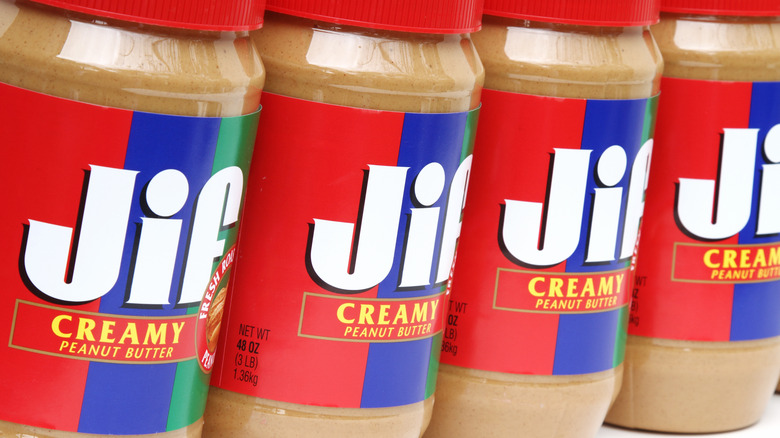The Biggest Food Recalls In Sam's Club History
It doesn't matter where you shop; Product recalls can impact any grocery store chain. While the odds of a recall impacting the food in your pantry are relatively slim, they happen often enough that it's worth staying on top of the latest recall news — especially if you purchase your groceries in bulk from a warehouse store like Sam's Club, where you may have unknowingly purchased a large amount of an item that's since been deemed unsafe.
The Walmart-owned, membership-only chain has experienced its fair share of product recalls since opening in 1983. Like any supermarket, it sells a wide variety of products from a long list of suppliers, which makes the occasional recall inevitable. Fear of contamination is typically the biggest reason for a recall, with everything from recorded salmonella outbreaks to complaints of foreign objects triggering cases in the past. Here are 13 of the biggest food recalls that had Sam's Club shoppers double-checking their kitchen shelves over the years.
Deli meats (2024)
The slightest whisper of salmonella is nearly enough to trigger a mass product recall. In January 2024, there were much more than whispers that charcuterie trays sold at Sam's Club contained the dangerous bacteria. The Centers for Disease Control and Prevention (CDC) linked the deli meat to sickness among over two dozen customers across 14 states.
Fratelli Beretta USA, also known as Busseto Foods, subsequently recalled over 11,000 pounds of the Busseto Foods' Charcuterie Sampler. An estimated 323 Sam's Club stores in 27 states stocked the deli meat at the time and, consequently, pulled the trays (which contained a mixture of prosciutto, sweet soppressata, and dry coppa, or black pepper-coated dry salami, Italian dry salami, dry coppa, and prosciutto) from shelves as a precaution. Customers were warned to not only throw out all trays with a sell-by date of April 27, 2024, but also clean anything they may have touched with hot water. The CDC theorized that many more people had been infected without realizing it was salmonella, and, as numbers continued to grow and 10 were hospitalized, it eventually encouraged Sam's Club customers to throw out all trays — regardless of their lot code.
Turkey burger (2011)
Charcuterie trays are far from the only food item to spark salmonella panic at Sam's Club. Back in 2011, nearly 55,000 pounds of raw turkey burgers were recalled from its stores after 12 customers were infected (and three were hospitalized) in 10 states.
To be specific, it was the Jennie-O Turkey Store: All Natural Turkey Burgers that caused chaos. Three of those infected specifically recalled eating Jennie-O turkey burgers before becoming ill, with the USDA's Food Safety and Inspection Service (FSIS) claiming that it was "conducting traceback activities for a sample of Jennie-O brand ground turkey in an intact, unopened package from a case-patient's home."
Salmonella is scary in the best of times, but this outbreak proved to be particularly concerning as the CDC reported that the burgers had tested positive for salmonella hadar — a strain that has previously proven resistant to the most commonly prescribed antibiotics. This can make it particularly dangerous for those with already weakened immune systems, increasing the risk of hospitalization and unsuccessful treatment. Unsurprisingly, the FSIS classified this as a "high" health risk, and Sam's Club requested that anyone who found boxes in their home return them to the store for a full refund as soon as possible.
Smoked salmon (2012)
There are few foods that aren't improved by the salty, silky-smooth goodness that is smoked salmon. However, in 2012, Sam's Club shoppers were encouraged to ditch their purchases when a routine lab test on a yet-to-be-distributed shipment of salmon revealed that it was contaminated with listeria, a bacteria known to cause fever, diarrhea, sickness, and even fatal infections in those with vulnerable immune systems.
To be extra cautious, the companies responsible for producing the fish (Multiexport Foods Inc. and Tampa Bay Fisheries Inc.) decided to pull shipments that had already hit shelves. This impacted Sam's Club locations in 42 states and Puerto Rico, with the chain requesting that customers bring their smoked salmon, which was sold under the brand name Paramount Reserve in November and December of that year, back to the store for a full refund as soon as possible. Fortunately, no illnesses were linked to the recalled products, but always better safe than sorry.
Fruit purée (2023)
October 2023 saw a lead scare that impacted not only Sam's Club but Amazon and Dollar Tree, too. A mass recall occurred after the State of North Carolina conducted an urgent investigation into why several children were experiencing elevated lead levels in their blood along with headaches, nausea, and fatigue — all potential signs of acute lead poisoning. The North Carolina Department of Health and Human Services managed to pin down one possible source, which later tested positive for extremely high concentrations of lead — WanaBana apple cinnamon fruit purée pouches.
Considering the fact that even low levels of lead in the bloodstream can cause irreversible cognitive impairment, it should come as no surprise that the Food and Drug Administration insisted upon a recall of all pouches. Anyone who had previously purchased the WanaBana products was encouraged to return the kid-oriented snacks for a refund or exchange, while parents who suspected their children had been exposed to lead via the pouches were told to talk to their doctor about a blood test, just in case. By December, there were 64 cases linked to the WanaBana pouches across 27 states, triggering an onsite investigation of the manufacturer's factory in Ecuador, making this one of the more dramatic recalls to hit Sam's Club stores.
Chicken nuggets (2014)
There's a long list of stories (some scarily accurate, others creative but false) about what actually goes into chicken nuggets. However, one thing that rarely makes the list is plastic — except in 2014 when the material did somehow manage to make it into nuggets stocked on Sam's Club shelves.
Tyson Foods Inc. recalled 75,000 pounds of frozen nuggets in August of that year after receiving complaints that they contained tiny pieces of plastic. It's thought that a faulty product scraper had broken in the blending machine on two production dates – January 26 and February 16, 2014 — which in turn contaminated the nuggets with an unplanned and potentially dangerous extra ingredient. Unfortunately, several customers had already eaten the nuggets and suffered minor oral injuries.
To avoid more incidents (and the risk of legal action), 5-pound bags of Tyson Fully Cooked White Meat Chicken Nuggets with a use-by date of January 26, 2015, or February 16, 2015, were recalled at Sam's Club stores nationwide. Tyson also pulled its 20-pound bulk packs of nuggets that it had shipped for institutional use in Indiana and Arkansas.
Macarons (2022)
Plastic has a habit of getting into places it shouldn't, as a second contamination incident proved in late 2022. This time around, it was Member's Mark Holiday Macarons, a festive edition of the iconic French cookie that typically comes in seasonal flavors such as Vanilla, Salted Caramel, Hot Chocolate, Cookies 'n Cream, Red Velvet, and Creme Brûlée, that were affected.
Around 148,800 units of the cookies were recalled from Sam's Club stores between December 2022 and January 2023. Sublime Desserts, Inc. triggered the recall after discovering that there was a possibility that they could contain plastic particles. What makes this recall so tricky is the fact that the macarons have such a long shelf life and are supposed to be kept frozen. The macarons affected had sell-by dates running all the way through to December 2023, meaning there's always a good chance that some lurked in the depths of Sam's Club customers' freezers and missed the recall notice entirely.
Muffins (2021)
A mass recall went down in July 2021 when Give and Go Prepared Foods (U.S.A.) Corp warned that its muffins may be contaminated with listeria. Sam's Club was just one of several retailers hit by the recall, which affected a whopping 26 products in total — including Uncle Wally's Twin Muffins, sold at Sam Club's stores nationwide in blueberry, chocolate chip, and walnut varieties.
Luckily, Give and Go Prepared Foods claimed that no illnesses had been reported as a result of chowing down on the muffins and that the recall was just a precautionary move after the FDA found that the products were very possibly affected by listeria monocytogenes as a part of its environmental monitoring program. Anyone who had the muffins stocked in their pantry was advised to dispose of the baked goods as a precaution, with the FDA officially wrapping up its recall not long after. Again, better to throw out your breakfast than have your stomach regret it later.
Fresh fruits (2023)
In November 2023, a deadly listeria outbreak in North Carolina was tracked to fresh peaches, nectarines, and plums sold at Sam's Club and other retailers. By the time the FDA linked the outbreak to the fruits, the affected products — which were produced by HMC Farms — were long gone from the shelves of all retailers. However, a concern was that some customers may have frozen the fruit to use at a later date.
The fruit in question spanned six varieties: yellow peaches, white peaches, yellow nectarines, white nectarines, red plums, and black plums. While at least 11 people got sick after eating the stone fruits, one died, and a pregnant victim went into early labor during her sickness. With listeria able to survive freezing temperatures, the CDC not only warned that customers should throw out any affected or potentially affected fruits but also clean anything else the fruits may have touched.
Ground beef (2018)
Ground beef was at the heart of another deadly outbreak in 2018 when 132,000 pounds of meat were recalled from grocery stores — including Sam's Club – by Cargill Meat Solutions. According to the USDA, the meat presented a risk of E. coli contamination, a bacteria most commonly found in raw or undercooked beef that can cause stomach pain, diarrhea, and even kidney failure.
The meat was linked to at least 17 illnesses and one death between July 5 and July 25, 2018. Sam's Club stores nationwide were impacted by the recall. Anyone who may have purchased the meat was encouraged to carry out the standard check on their freezer for meat dated June 21 and dispose of any affected products. While healthy adults typically recover from an E. coli infection within a week, serious issues are much more likely in very young children and the elderly. Considering the fact you can develop an infection by consuming even a tiny amount of bacteria, this recall was carried out with an understandable amount of urgency.
Dog food (2023)
Even pet food isn't off limits from the odd recall. However, this one didn't occur because it made dogs and cats sick. Instead, two flavors of canned Member's Mark dog food, produced by Mid America Pet Food (Beef & Brown Rice and Salmon & Sweet Potato, to be precise), were recalled in November 2023 after seven people were infected with salmonella.
With the majority of these seven people being infants, it's thought that the contaminated pet food infected those who touched the floor and pet bowls, or that the infants' caregivers passed it on by not washing their hands after feeding their dogs. Pets can also contract salmonella and act as carriers, passing it on to both other animals and humans. Infants are much more prone to serious infections from salmonella, and one was reportedly hospitalized due to the outbreak.
Retailers other than Sam's Club were also hit by this recall, with some having more than two products pulled from their shelves. However, for those who do rely on Sam's Club's Member's Mark collection to feed their pets, this was likely a pretty scary time.
Canned chicken (2018)
Another day, another panic that your food may contain plastic. In March 2018, it was canned chicken that sparked fears of contamination, with nearly 100,000 pounds recalled from Sam's Club stores after two different customers reported finding hard pieces in their food.
The exact product pulled from shelves was the Member's Mark Premium Natural Chunk Chicken Breast in Water with use-by dates of November 28, 2019, and November 29, 2020 (yep, canned meat lasts a really long time). Produced by Tony Downs Food Company, Inc. in Minnesota, it's believed that the thermally processed chicken was contaminated in late November 2017. Luckily, complaints never escalated any further — and no illnesses were reported — with all Sam's Club customers advised to just throw out any cans in their cupboards or return them to their place of purchase at their earliest convenience.
This wasn't the first time Sam's Club has had to pull chicken from its shelves. A few years prior, it also conducted a joint recall with Walmart and Aldi over fears that one of the ingredient suppliers for multiple breaded chicken products by Maxi Canada, Inc. (including nuggets, chicken breasts, and chicken fries) used dairy in the breading, despite the allergen not being listed on the label. This potentially posed a serious risk to those who can't consume dairy, but fortunately, the USDA confirmed zero reported cases of sickness stemming from the recalled chicken products.
Ham (2016)
A different meat (and a different source of contamination) sparked a recall in 2016. Nearly 9,000 pounds of pre-cooked, vacuum-sealed ham was scrapped from Sam's Club stores after a customer, quoted by Consumerist, found what they described as "various sized pieces of what appeared to be rubber material" in the pork.
Fletcher's Fine Foods Classics Black Forest Brand Ham with Natural Juices was produced by 502 Boundary Blvd. (previously known as Fletcher's Fine Foods) in Washington before being packaged in Ontario, Canada, and shipped to Sam's Club stores across the U.S. According to Fortune, the USDA claimed that anyone who purchased and consumed the meat risked encountering a "health hazard situation where there is a remote possibility of adverse health consequences," due in no small part to the number of chemicals used in the production of rubber. As usual, anyone who'd purchased the ham was told to either return it to a Sam's Club store or take the low-effort route of just throwing it out. However, in the end, it seems only one customer was unlucky enough to stumble across the rubbery bonus ingredient in their ham.
Peanut butter (2022)
Whether you're a PB&J addict or a straight-from-the-jar-with-a-spoon kind of person, a jar of peanut butter can get you a long way in the kitchen, but that's only if the jar in question wasn't Jif Peanut Butter purchased at any Sam's Club (or Walmart) in mid-2022.
In May of that year, over four dozen types of Jif Peanut Butter products, including Jif Creamy Smooth Peanut Butter and Jif Squeezable Pouches (with specific lot codes) were recalled by The J.M. Smucker Co. due to potential salmonella contamination. The CDC reported over 21 confirmed cases of illness and two hospitalizations linked to the outbreak, with around 80% of this number claiming to have eaten Jif before their sickness. Later that month, the recall expanded to other food brands that used J.M. Smucker-produced peanut butter in their products, including Garden Cut, Coblentz Chocolate Company, and Mary's Harvest Fresh Foods.
Fast forward two years and some customers are still angry about the peanut butter recall. In January 2024, Wayne and Mary Hinkin filed a lawsuit against both J.M. Smucker Co. and Sam's Club. Wayne Hinkin demanded at least $75,000 in damages for negligence and liability, having allegedly contracted salmonella so badly in 2022 that he felt the effects for weeks. Supporting his case is the fact that in early 2023, the FDA said testing at J.M. Smucker's plant in Kentucky had consistently pointed to salmonella for months before the recall.
